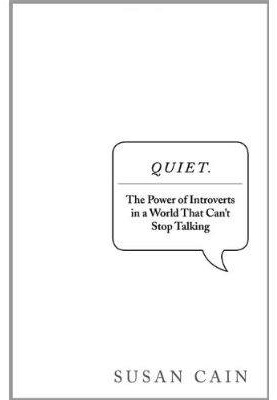Quiet: The Power of Introverts in a World that Can’t Stop Talking by Susan Cain

In a promotional interview with Amazon.com, Susan Cain compares her decision to write Quiet – a whistle-stop digest of the problems faced by shy people in the loud and brash contemporary US – to Betty Friedan’s publication of The Feminine Mystique 50 years ago. In the book’s opening sections meanwhile, Cain sets out her stall with repeated references to the civil rights movement, quickly stating that “our lives are shaped as profoundly by personality as by gender or race.”
The next 270-plus pages examine the shaping influence of personality, through the multifarious lenses of business, neurobehavioural psychology, and cultural anthropology, concluding with a less clearly-defined cocktail of the three, from which Cain pours a series of saccharine pabulums: “Love is essential…Cherish your nearest and dearest…Relationships make everyone happier”. The real meat of the book, and its justification of the reader’s time (if not the lofty claims its author makes for its importance), comes in the first three quarters.
A former Wall Street lawyer, Cain is an able corporate historian who turns up some fascinating accounts, often marginalia, on the early motivational techniques of big business (IBM salesmen warming up for a day of work with a group rendition of “Selling IBM/We’re Selling IBM” to the tune of Singin’ in the Rain is a particular highlight). Her insights on the current schools of psychology on the introvert/extrovert debate are also interesting and open up the field for lay readers admirably, even while subtly cheerleading for the quiet, thoughtful, “high-reactives” throughout.
It’s when Cain tries to stretch the models she forms in these sections over the shape-shifting mass of the global culture that her thesis stumbles badly. The argument that we should attach such momentous importance to introversion, by Cain’s own admission just one of the millions of temperaments the human brain is able to kick-start in person’s a lifetime, just isn’t persuasive enough.
In a world whose financial system hadn’t been lastingly crippled by posturing and excessive risk, it’s hard to believe Quiet would have become a bestseller (the book’s Amazon page links to a number of similar titles that weren’t advertised on the tube). There are few more loathed figures in the current popular consciousness than those of loud, decadent and unthinking city boys. But the straight-faced implication that such outsized personalities are equally tyrannous as centuries of racial or sexual repression is at once silly and tasteless.
The editorial unit
Quiet is published by Penguin on 3rd January 2013. For further information or to order a copy visit the book’s website here.
























Facebook
Twitter
Instagram
YouTube
RSS